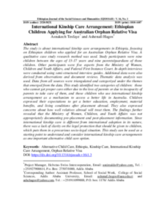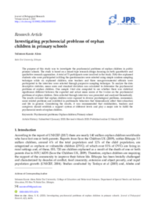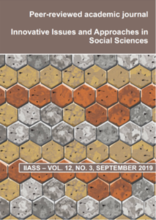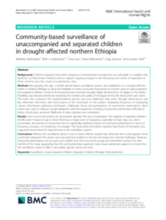childrens_living_arrangement
children_living_without_bio
Displaying 11 - 20 of 70
This study is about international kinship care arrangements in Ethiopia, focusing on Ethiopian children who applied for an Australian Orphan Relative Visa.
The purpose of this study was to investigate the psychosocial problems of orphan children in public primary schools in Ethiopia.
Vulnerable children and families need a strong social support network that acts as a safety net to effectively and sustainably respond to the situation of children and families at risk.
The authors of this study conducted qualitative interviews of 69 caregivers in four countries: Ethiopia, Kenya, Cambodia, and India (Hyderabad and Nagaland), and across four religious traditions: Christian (Orthodox, Roman Catholic, and Protestant), Muslim, Buddhist, and Hindu. They asked respondents to describe the importance of religion for their becoming a caregiver, the way in which religion has helped them make sense of why children are orphans, and how religion helps them face the challenges of their occupation.
The objective of this study was to evaluate the health status and anthropometrical development of adopted children from Ethiopia living in southern Spain.
This study from Innovative Issues and Approaches in Social Sciences examined perceptions and practices of domestic adoption in Adama City in Oromia/Ethiopia. The study reveals that people’s perception towards adoption practice, adoptive parents and children is mixed; it could be positive and encouraging or negative and discouraging.
This paper examines all policy and laws related to families in the South, West, East and Central regions of sub-Saharan Africa.
The special issue of Emerging Adulthood titled “Care-Leaving in Africa” is the first collection of essays on care-leaving by African scholars. This article, coauthored by scholars from North and South, argues in favor of North–South dialogue but highlights several challenges inherent in this, including the indigenizing and thus marginalizing of African experience and scholarship and divergent constructions of key social concepts.
This study used a qualitative research design to uncover female care-leavers’ experience of aftercare in Ethiopia in 2017.
In this study, a mobile phone-based surveillance system was established in a drought-affected district in northern Ethiopia to assess the feasibility of using community focal points to monitor cases of unaccompanied and separated children.





